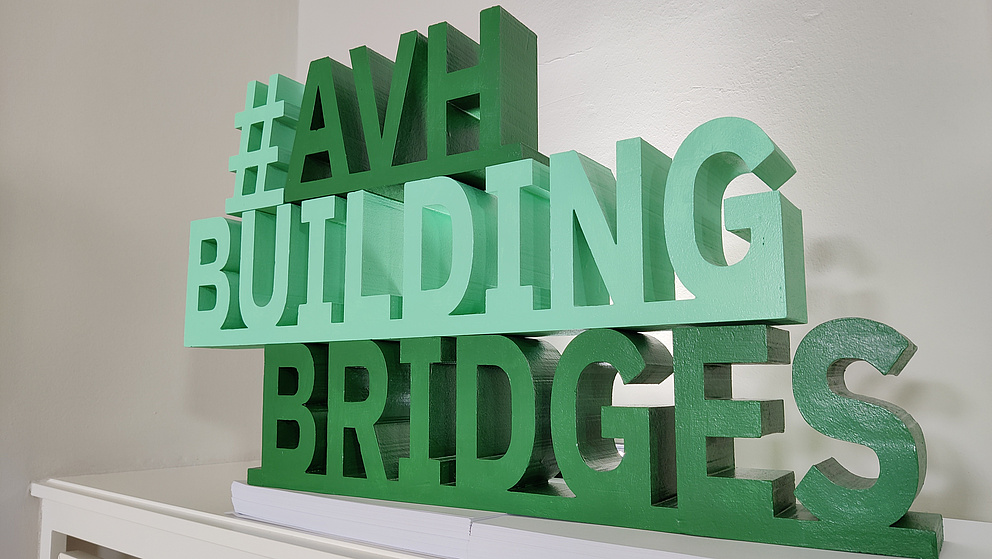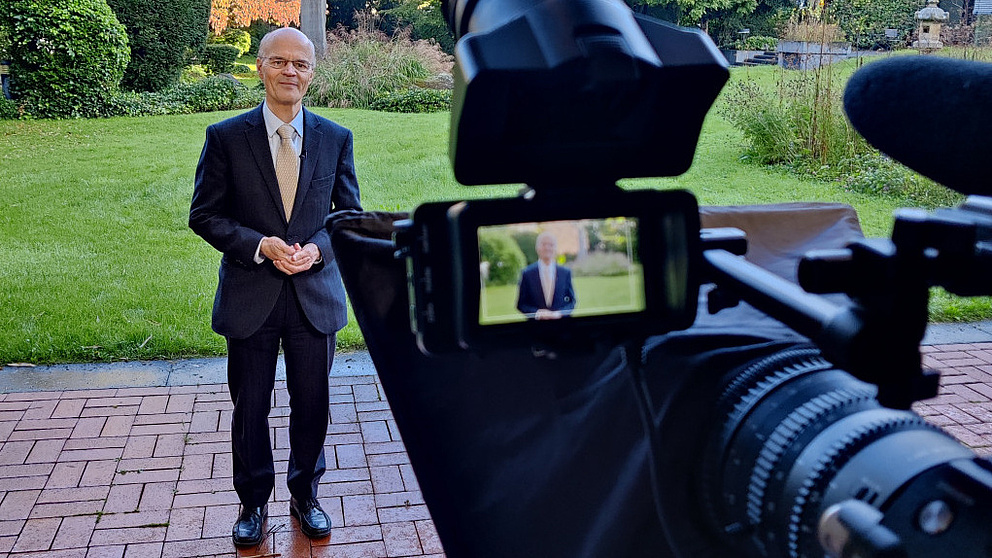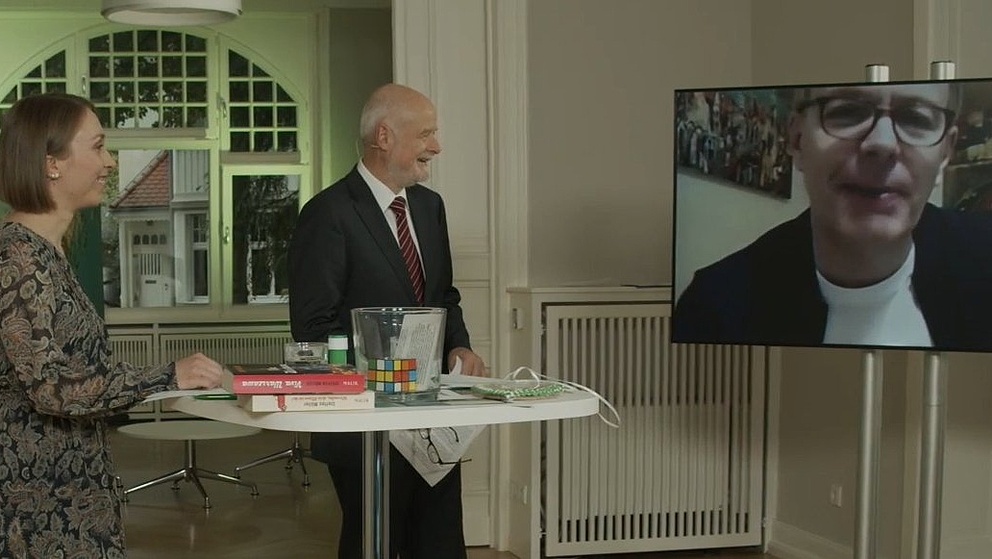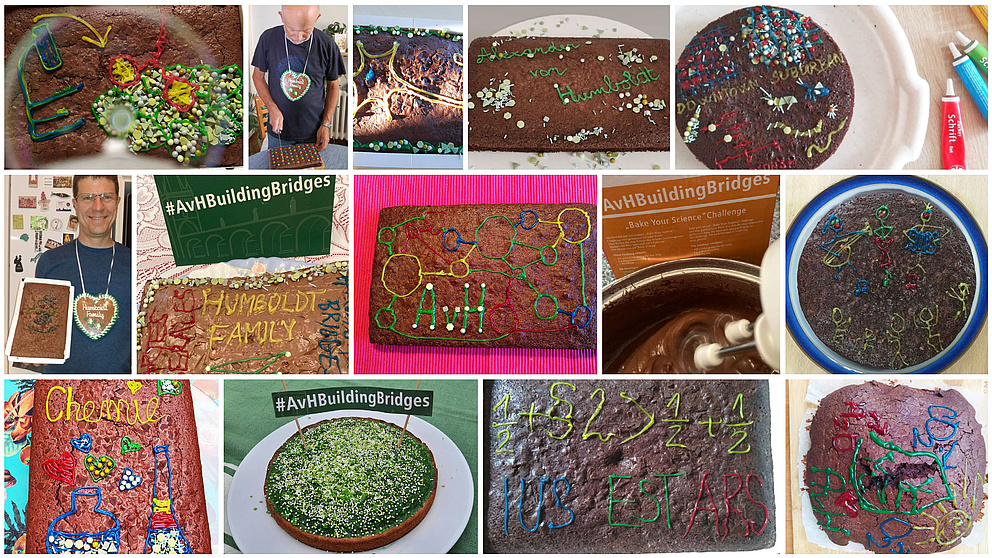
Contact
Press, Communications and Marketing
Tel.: +49 228 833-144
Fax: +49 228 833-441
presse[at]avh.de

“The colloquium showed us that we can depend on one another”, was the positive conclusion reached by Pavol Sajgalik, President the Slovak Academy of Sciences in Bratislava, during the closing session of the virtual conference held on 23 and 24 September. “We really are a family and that feels good,” something he said he once again experienced during the meeting.
Over the course of two days, the virtual conference sponsored by the Foundation and the University of Warsaw gave approximately 150 Humboldtians from Poland, the Czech Republic, Slovakia and Hungary along with young researchers from these countries the opportunity to establish new contacts and share information and expertise. The diversity of the disciplines represented in the East and Central European network was reflected in the high-profile keynote lectures on learning a language that was designed by a computer and on the properties of black holes plus workshops on topics ranging from literature to geosciences all the way to computer science, where participants had the opportunity to talk about their experience and share expertise.
The meeting however also focused on the question of how brain drain from these countries can be prevented and brain circulation set in motion there - in other words, how science in the region can be strengthened on a lasting basis. In the spirit of the motto Building Bridges, Moving Minds: The Role of the Humboldt Network in Fostering Research Cooperation in Europe, the difficult conditions for research in the Visegrad countries and the role of researchers in societies where populism and anti-intellectualism are on the rise were also discussed.
“On the occasion or the 30th anniversary of the Treaty of Good Neighbourship between Germany and Poland, we will be looking at the role Humboldtians play as bridge builders in Europe during this colloquium”, said Enno Aufderheide, Secretary General of the Humboldt Foundation, during his opening speech about the colloquium which was originally supposed to be held in Warsaw. Drawing upon memories of his trips to the individual countries and long-standing friendships, Aufderheide underscored in his speech the special importance of Humboldt alumni in Poland, Slovakia, the Czech Republic and Hungary and their identification with the network.

In light of the global challenges facing humanity, science is also very important in the area of policy consulting, underscored Arndt Freytag von Loringhoven, Ambassador of the Federal Republic of Germany in Poland, who attended the meeting as the representative of the Federal Foreign Office. “You, dear Humboldtians, have produced excellent ideas and results we can count on. We are proud of you!” Freytag von Loringhoven told the audience. “I am fully convinced that freedom of science has never been as important as it is today. But this is not all. Freedom of science is always related to personal and individual freedom. We have to make sure that diversity in origin, gender and social attitudes does not hinder personal development. Excellence in science is directly linked to diversity in lifestyles”, the ambassador added.

The strength of the Humboldt Foundation’s network of trust is reflected in the openness with which the Humboldtians from Central and Eastern Europe reported on the challenges they currently face. Today, more than 30 years after the Velvet Revolution and the collapse of communism there has been a lot of progress made, but poorly equipped facilities, low wages and science’s lack of prestige are still hurdles in some instances - particularly when it comes to recruiting young researchers and bringing fresh air into research groups, noted participants.
“Most of my students are abroad, I really can’t advise them to come back to Hungary”, reported the Hungarian physicist Örs Legeza from the Wigner Research Centre for Physics. Thanks to international collaborations like those funded by the Humboldt Foundation he has “survived the system”. Absolutely nothing better could have happened than a borderless Europe with its free movement of persons - but, for science, he added, mobility in both directions - from Hungary into the world and vice versa - would be desirable.
The Czech biochemist Vladimia Petrakova works in her country to promote this two-way mobility. Most recently, she spent three years conducting research at Freie Universität in Berlin and experienced herself that it is not all that easy for researchers working abroad to return home, even when they want to - due to the fact that they lack contacts. In response, this bridge builder founded the Czexpats in Science initiative with like-minded colleagues. This initiative brings Czech researchers who want to return home together with institutions in their home countries and helps mobile researchers maintain their contacts with home right from the start.
In one area however, her country still has a long road ahead: Things aren’t looking good for gender equality. “I returned from Berlin as a mother with four children and was shocked. Here, just the word “gender” triggers toxic reactions. There are still people who believe that the fact women are underrepresented in the sciences simply reflects a natural order”, reported Petrakova about her struggle for gender equality and structural support for female researchers. “It is awfully hard to juggle a career and family. But it is wrong for women to think that they are weak just because they demand help and make use of help that is offered”, said the expert for nanotechnology at the J. Heyrovsky Institute of Physical Chemistry in Prague.
And what role do female researchers play in matters involving important social and political issues such as vaccines? “It’s important to stay calm and continue explaining to society what is based on rational, evidence-based knowledge, and what is based on fake news and irrational thinking”, said Pavol Sajgalik, President of the Slovak Academy of Sciences. “This requires researchers to go to the media, be on television, radio and social media”, was his appeal for science communication.
Just how helpful the diversity of the Foundation’s global network can be was illustrated by Katarzyna Marciniak, the Humboldt Foundation’s former Ambassador Scientist in Poland. The classical scholar examines how the ancient world and its mythological creatures make their way around the world in various adaptations. For her international research project Our Mythical Childhood, Marciniak got to know several colleagues through the Humboldt network and could recruit them for it. With this project Marciniak became the first individual in the history of the Polish humanities to be chosen to receive a Consolidator Grant of the European Research Council for her research. “Besides the connections and bridges we already have, there is one really important, solid bridge that we are missing for our work - and that is a united Europe”, said Marciniak.
The Humboldt Foundation thanks all those alumni who contributed to the success of the colloquium through their participation. When all goes well, the Foundation hopes that it will soon be receiving successful applications and new Humboldtians from Poland, the Czech Republic, Slovakia and Hungary can be welcomed into its network in the near future.

